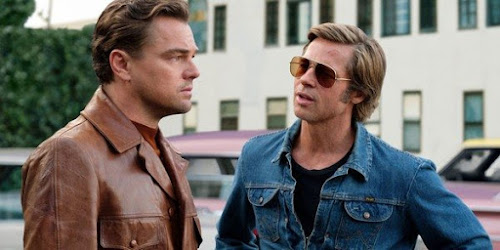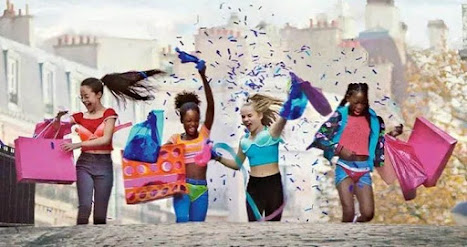Once Upon a Time in Hollywood (Dir. Quentin Tarantino, Sony Pictures, 2019)
 |
| Leonardo DiCaprio and Brad Pitt star in this infectious tribute to Hollywood's Golden Age |
I had actually seen this in theaters during its initial release and had drafted a review but forgot to publish. This actually gave me time to rewatch the film and gather my thoughts and come to a different perspective that I had not seen before.
In Quentin Tarantino's latest film, Once Upon a Time in Hollywood, tells the story of actor Rick Dalton (Leonardo Dicaprio) and his stunt double Cliff Booth (Brad Pitt) as they navigate the turning tides of the film industry, backed by a host of heavyweight characters they encounter along the way. The film is set during the summer of 1969 and is used a love fest for the Golden Age of Hollywood. By using the story of Rick Dalton's desperate climb back to the top of the Hollywood food chain, it tells a revisionist fairy tale of the Manson Family murders, which is given a happier ending. I enjoyed the film and its homage to old Hollywood and the city during the 1960s. After finishing the film, I did leave with some criticisms.
Although the gruesome ending is a staple in Tarantino movies, I felt the violence that was directed towards the female characters was unnecessary, which saw one getting her head smashed into a fireplace and being set ablaze by a torch blower. Every female character throughout the film was flat and received absolutely no character development. I suppose it was done to pass the Bechdel test, but they could've done without. Margot Robbie, who played late actress Sharon Tate, who was one of the victims of the Manson murders, hardly had any lines despite being an important part of the parallel Manson cult murders plot. I felt the women who were apart of the cult at Spahn Ranch were there for no reason, despite the use of the parallel/internal plot in the movie. For example, Cliff Booth encounters a young hitchhiker, Pussycat, who attempts to solicit oral sex from him, much to her dismay as he is wary of her age. She is basically used as a sexual prop, with not much development outside of being a horny hitchhiker. I noticed when the female characters were introduced by their legs, then their faces, with the camera panning upwards; the viewer acknowledges the body before the person. Then again, Tarantino has done this before in films, where he tends to focus on feet, such as Kill Bill and Death Proof.
I felt like the film could've done without the subplots, as I would've liked it better had it focused on the relationship between Rick Dalton and Cliff Booth and Dalton's quest to get back on top in the film industry, which would've sufficed. I found it unnecessary to have all of the characters that didn't really do much towards moving the plot along in the film, such as when Sharon Tate and Roman Polanski (Rafal Zawierucha) attend a party at the Playboy Mansion and Steve McQueen (Damian Lewis) converse with a fellow partygoer about the relationship between Jay Sebring (Emile Hirsch), Joanna Pettet (Rumer Willis), Tate and Polanski. I felt that was an unnecessary scene in the film and it should've been cut. I suppose it tied in Tarantino's homage to the glamour and allure of Hollywood during that era and finality of the Golden Age. Or it could've been like how one can go someplace and see all of these different characters at the same time. The scene is put to good use for a viewer who happens to be a film buff like I am, to witness all of these old Hollywood stars in one place at the same time.
 |
| From L to R: Brad Pitt, Leonardo DiCaprio, and Al Pacino |
For Tarantino to have cast Al Pacino, an actor of such great magnitude, he didn't do much with him, just like the other characters in the film who were just there. Another example of this is the scene where Booth gets into a fight with Bruce Lee played by actor Mike Moh. I felt he was portrayed as a caricature and another throw away.
Overall, I did enjoy the film despite the qualms I had with it. I would rate the film a 7 out of 10.



Comments
Post a Comment